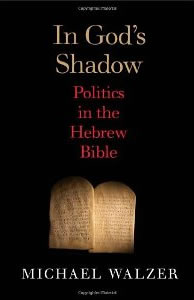Book Notes
 Michael Walzer, In God's Shadow; Politics in the Hebrew Bible (New Haven: Yale University Press, 2012), 232pp.
Michael Walzer, In God's Shadow; Politics in the Hebrew Bible (New Haven: Yale University Press, 2012), 232pp.
When Michael Walzer (b. 1935) says that he reads the Hebrew Bible like "an ordinary reader," what he means is that he's not a Biblical scholar by training. But he's anything but an "ordinary reader." He's professor emeritus at Princeton's Institute for Advanced Study, and one of the country's leading political theorists and public intellectuals. And although he admits that he has only a school boy's knowledge of Hebrew, he's been reading the Bible for over seventy years, and his footnotes show that he's well versed in the scholarly literature. He's written an extraordinary book aimed at a general readership and characterized by lucid prose.
Walzer has written a Biblical theology that starts with Genesis and proceeds through Israel's unfolding history and literature. Successive chapters explore the covenants, the legal codes, the conquest and holy wars, the kings and prophets, exile and priests, wisdom literature, and then messianism. He continually teases out the various nuances and layers of the Biblical narrative. For example, Israel began with two different but related covenants — one with Abraham based upon kinship, family, and birthright as a chosen people, and another with Moses, based upon a legal covenant, a nation, law, and a people who might be chosen but who also must freely choose.
His major and most provocative emphasis is that while the Hebrew Bible contains a lot about politics, it isn't really interested in politics. Rather, it presents us with a radical anti-politics. Since God is sovereign, caesar is secondary. The prophets, for example, are poets of social justice and the most important form of public speech in Israel, but they're not political activists with any program. With their emphasis on divine intention as opposed to human wisdom, the prophets exemplify the Hebrew Bible's "radical denial of the doctrine of self-help." The prophets "disdain" politics. In contrast to Greek philosophers, "the Biblical writers never attach great value to politics as a way of life." Politics is simply "not recognized by the Biblical writers as a centrally important or humanly fulfilling activity" (125, 186).
In place of radically relativized politics, the Hebrew Bible commends an ethic or way of life. Micah 6:8 comes to mind: do justice, love kindness, walk humbly with your God. Protect the weak, feed the poor, free the slaves, and welcome the alien. Free individuals will make choices that result in a good or bad society. Needless to say, human experience shows a mixed record in this regard. Still, however complex our choices, the sovereign God calls each one of us to a larger community that's characterized by "fellow feeling." That is, we trust ourselves to God alone and are responsible for each other.
Dan Clendenin: dan@journeywithjesus.net


